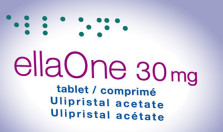News that the morning-after pill, ellaOne (which can be effective up to five days after sex), is now available for use by any woman of reproductive age in Europe, without parental consent, from pharmacies everywhere, is – to put it mildly – ill-advised.
To put it less mildly, it is an ill-conceived knee-jerk response to Britain’s epidemic of unplanned pregnancy, abortion and sexually transmitted disease amongst teenagers. And, importantly, it is not evidence-based.
Let’s look at some of the evidence.
Contrary to received wisdom (that free widely available contraception reduces the rate of unwanted pregnancies), the evidence is actually mixed, with some clearly showing that emergency contraception has the opposite effect!
Peer reviewed research has found that Government schemes to give teenagers the morning-after pill for free at pharmacies simply encouraged young people to have unprotected sex and failed to cut the number of teenage pregnancies! Professors Girma and Paton of Nottingham University compared areas of England where the scheme was introduced with those where it was not, or where it was implemented later. They found that pregnancy rates for girls aged under 16 remained the same. Paton’s work has been published in the peer-reviewed Journal of Health Economics so cannot be easily dismissed.
A recent US study in February 2015 estimated the impact on abortions and risky sexual behaviour from making the morning-after pill available over the counter without prescription, as measured by sexually transmitted infection (STI) rates. It similarly found that providing individuals with over-the-counter access to emergency contraception (EC) had no effect on abortion rates and led to increased STI rates.
This is not what we usually hear!
Of course, it could be argued that emergency contraception is still needed, to keep unintended pregnancies down, and while evidence is inconclusive, it can surely do no harm? Hence, the Family Planning Association says: ‘We’d like to see a lot more free provision of emergency contraception.’
But can it do harm? In the long-term, yes!
The immediate accessibility of free contraceptives has been found to actually increase rates of sexually transmitted diseases. David Paton found that where there was an emergency birth control scheme operating, sexually transmitted disease rates for under 16s increased by 12%.
The new US study likewise found that risky sexual behaviour such as engaging in unprotected sex and number of sexual encounters increased as a result of over-the-counter access to emergency contraception.
Why is this?
‘Risk compensation’ is a phenomenon where applying a prevention measure results in an increase in the very thing it is trying to prevent. In this case, some teenagers will take risks they would not otherwise take, because contraception and abortion are promoted as risk reduction measures. So if a girl is on the pill, or knows she has a stack of emergency contraceptive pills at home, then her sexual behavior will seem to her to be less risky or costly and so she will continue with it or even increase it, in the false belief that she will not suffer harm. This growing reliance of teenagers on the pill means they are not protected against sexually transmitted infections such as chlamydia, which can cause infertility.
The US research concluded that switching emergency contraception to over the counter status has three main effects on behaviour: individuals are more likely to have sex, they have a higher number of sexual encounters, and are less likely to use condoms.
A 2012 American study also found that making emergency contraception available free over the counter without prescription leads to an increase in rates of sexually transmitted infections and does not decrease pregnancy or abortion rates.
But there are also other concerns that this new licensing raises, which I only have space to mention briefly.
In the publicity for this change in licence, the promoters of the pill, and the pro-abortion advocates of it, refer to under 16 year olds as ‘women’. But to most parents, a girl who is 15 or less is still a child. Twisting language in this way is simply an attempt to cover up the reality that this policy is directed to children who are being given, without parental knowledge, high doses of powerful hormones.
Sex under 16 is not only illegal, it can also be profoundly damaging – physically, and emotionally. So to facilitate such behaviour behind parents’ backs is unprofessional, irresponsible and morally wrong. It utterly undermines parental responsibility for their children and exposes them to harm and risk.
Teenagers often regret the age when they started having intercourse, and over 40% of teenagers in the UK give peer pressure as the reason for first intercourse.[1] Who will be taking a detailed history from these girls to ensure that they are not being exploited, coerced or abused? Under the UK NICE guidelines, no-one.
Also, as explained here, retailers are not being fully honest about the mechanism of action of the drug. Its action is not solely directed at suppressing ovulation and preventing fertilization, it also acts by preventing the implantation of the early human embryo. Ie. it is embryocidal, or abortifacient, which will be a real concern for those who believe that life begins at fertilisation.
We should be promoting real behaviour change. That will mean keeping parents involved. But it also puts responsibility on us all. It is adults who have exposed children of all ages to a society obsessed by sex, putting them under enormous pressure to conform.
However, rather than dealing with the causes, society tinkers with the consequences, compounding the problems further, with yet another unproven strategy which is apparently driven more by ideology than evidence.
Of course, in the end, unpalatable as it is for those who do not hold to Christian truths, nothing will work as safely and effectively as the biblical model for sex: save it for marriage.
Posted by Philippa Taylor
CMF Head of Public Policy
References
[1] Dickson N et al. First sexual intercourse: age, coercion, and later regrets reported by birth cohort. BMJ 1998; 316:29-33




